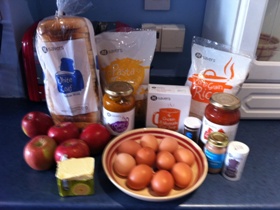17 April 2012
Living below the line
Around 1.4 billion people live on less than £1 a day. idea editor Chine Mbubaegbu spent five days seeing what this was like ahead of the Live Below the Line challenge taking place in May...
I looked on, stomach groaning, as my colleagues tucked in to a vast spread of curries and rice with all the accompaniments, followed by some delicious-looking desserts at the retirement do for my magazine’s advertising manager.
I wasn’t partaking of the culinary feast, because unfortunately for me, this took place during my Live Below the Line week. For five days, I took up the challenge of living on the equivalent of £1 a day of food to get a taster of what it’s like for the 1.4 billion people around the world who live on that amount - every single day.
Watching my colleagues fill their plates while I longed to get back to my value pasta gave me a small taster of the injustice that exists in our world regarding extreme poverty and extreme wealth.

Turns out the Capitol isn’t a million miles away from Kennington. Most of us in the UK can pretty much eat anything we want, while those living below the line for real are literally starving to death.
I hadn’t grasped just how difficult the Live Below the Line challenge was going to be until I actually turned up at the supermarket ready to do my shopping for the week. It was only then, basket in hand, that it dawned on me how meagre a sum a fiver is. There I was, faced with a vast amount of endless food possibilities and realising that I really could not afford very much.
The apples I placed in my basket made up around 20 per cent of my budget for the week. This was not going to be as straightforward as I thought. Walking around the store, I realised just how used to luxury I am. I love salmon, but two fillets are nearly £5, so obviously I had to back away slowly from the fish counter. I generally try to stay away from bread, but with very little choice of staple foods, I had to buy a loaf – the cheap, white-sliced kind that tastes like cardboard - but with around 30 slices for 19p, at least if all else failed I could have a bit of bread.
But, bread on its own? Have you seen how much butter or margarine costs? Extortionate. I very nearly picked up the lard, but was saved by a 50p pack of cooking butter of which I could budget for half. And so on, and so on. I bought cheap rice, cheap pasta, with various cheap accompaniments. And I have to confess: I bought caged eggs. I definitely did not have enough money for two of my favourite things: Diet Coke and coffee, so I realised I would face a massive caffeine withdrawal. Two items that saved me were a value pack of frozen sausages and a 14p pack of rich tea biscuits.
I was pleasantly surprised by the amount of interest I got from friends on social media. It sparked some interesting conversations and some mentioned how they had talked about it with their families, friends and colleagues. Food is pretty much essential to every human being, and we in the West are so used to being able to have what we want that I guess the somewhat extreme challenge of living on such a small amount captured people’s imaginations. They really did want to see how I was going to do it. And I ended up raising a bit of money for Christian Aid.
One thing the experience taught me was that you really can survive on £5 a week because our supermarkets provide value items for ridiculously low prices. But you’re not going to get a delicious meal out of it. You are certainly not going to get variety and you’re probably not going to get a balanced diet. More like a carb overload.
At times throughout the week, I had to remind myself of the reason why I was doing it. This was not a lesson in super-scrimping, but about raising awareness of the fact that this is the reality for millions of people around the world. And most of them don’t have access to supermarkets.
Yes, I got a caffeine headache; yes, my body craved some vegetables; and yes, my stomach rumbled a few times in meetings. But my five-day plight was nothing compared to those who are living in poverty and face the reality that they are way beyond the point of being a little bit hungry and actually facing death because they just don’t have enough to eat.
Please consider signing up for the Live Below the Line challenge (7-11 May) and raising money and awareness for those around the world for whom this is not a trial, but the real thing.
Top photo: Fishing is the main source of food and income in the tiny, riverside village of Mo-Albert in Sierra Leone. Photo courtesy of Christian Aid/Heidi Bradner
You might also be interested in
- 14 Aug 2018 Lighting up the darkness with Compassion UK
- 10 Nov 2017 Paying your tax?


